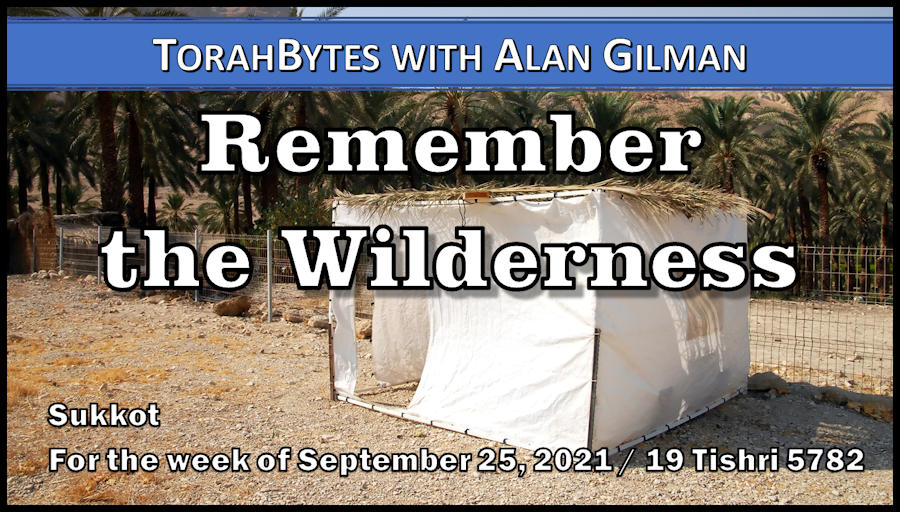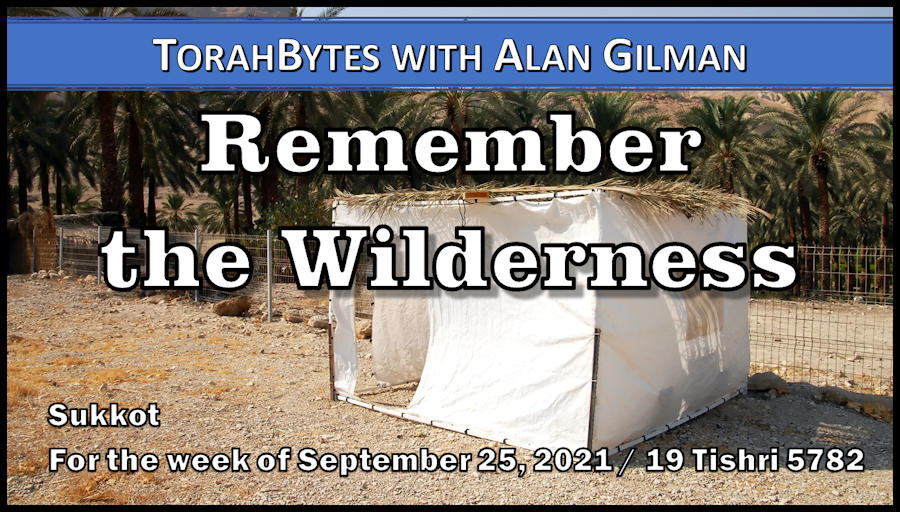Your cart is currently empty!

Remember the Wilderness

Remember the Wilderness
For the week of September 25, 2021 / 19 Tishri 5782

Sukkot
Torah: Shemot/Exodus 33:12 – 34:26; B’midbar/Numbers 29:23-31
Haftarah: Ezekiel 38:18 – 39:16
Download Audio [Right click link to download]
You shall dwell in booths for seven days. All native Israelites shall dwell in booths, that your generations may know that I made the people of Israel dwell in booths when I brought them out of the land of Egypt: I am the LORD your God.” (Vayikra/Leviticus 23:42-43)
The festival of Sukkot (English: Tabernacles or Booths) began this week the evening of September 20, 2021. Sukkot is the culmination of a special three-week period beginning with the Festival of the Blowing of the Shofar, commonly known as Rosh Hashanah (English: the New Year), followed ten days later by Yom Kippur (English: the Day of Atonement). The first two weeks focus on reflection and repentance in preparation for this week-long celebration of gratitude to God.
Central to the Torah’s Sukkot observances is the building of a sukkah, a temporary, somewhat fragile, though often beautiful, structure, intended as a temporary dwelling for the duration of the festival. The purpose of the experience of living in the sukkah was to remind the people of Israel that we lived in temporary shelters during the forty years of our wilderness travels prior to acquiring the Promised Land.
The wilderness period was a unique, but necessary, stage in the development of the people of Israel. Having spent generations as slaves in Egypt, they needed to be prepared for life in their own land. One day, they would have their own homes and farms and their own governmental and religious structures. They would develop international relations, including a time of renown and influence in the region. Israel was to be a bright light in an otherwise dark world.
However, a people don’t transition from being a nation of slaves to a shining example overnight. The people of Israel were called to be the people of God. In order to realize this, they needed to learn how human beings were to function in right relationship with the Creator. While their training wouldn’t cease upon entering the Promised Land, the forty years prior to doing so were foundational.
During the forty years, the people were completely dependent upon God. During that time the environment they were in provided no stability, protection, or regular provision. They were completely at the mercy of the elements and possessed nothing tangible on which they could rely to fend off enemy attacks. All this time, God saw them through by providing food, water, and protection from both the elements and enemies.
But this particular expression of divine help was not to be God’s will for Israel forever. It is not as if they were expected to live as if they were still in the wilderness, waiting for bread from heaven and other signs and wonders. Far from it! They were to settle the Promised Land and establish permanent agricultural settlements as well as fortified cities. Eventually they were to develop dependable political and military systems. They were to take responsibility for their lives and build a prosperous country.
Yet, despite the eventual normalcy of being a nation in their own land, there was something learned in the wilderness that was never to be forgotten, a life dynamic that was to be as much at work in the Promised Land as it was in the wilderness; a principle that is still as much at work today as it was then. That principle is human beings are completely dependent upon God.
By living in temporary shelters for a week once a year during Sukkot, the people of Israel were caused to experience in a small but tangible way a sense of vulnerability to the elements that is so easily forgotten when living in a permanent home. Seeing the stars, feeling the heat of the day or perhaps a few drops of rain were designed to bring to remembrance when their forebears’ very survival was in jeopardy each and every day unless God personally and powerfully came through.
The reality is that human beings are always dependent upon God. More permanent systems of protection and provision may give the impression that our security is derived from the things themselves. It is easy to forget that unless God works through such systems, they will not deliver as expected. Therefore, God deemed it necessary to remind Israel and the rest of the world through his Word, how this actually works.
We don’t necessarily need Sukkot to be reminded of this. Every now and then life’s circumstances throw us into highly vulnerable situations. If we have learned the lesson of the wilderness, we won’t crumble along with our failing structures. This is the challenge of our current day. Many think that our technical knowhow and political machinations will rescue us from disease and death. Until we learn that all the good we have ever experienced has come from the hand of God, we will continue to look in other directions when hard times come.
All scriptures, English Standard Version (ESV) of the Bible